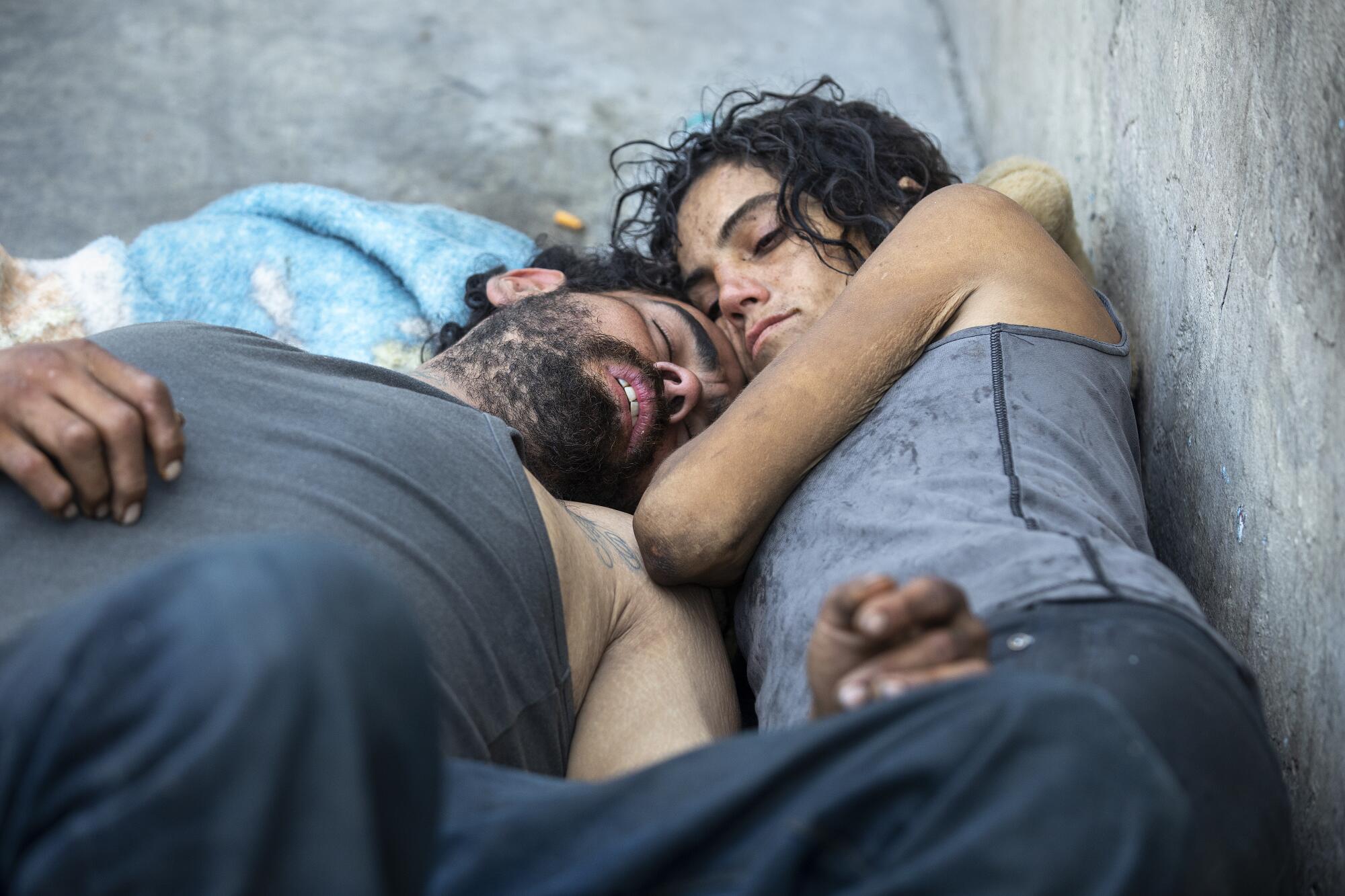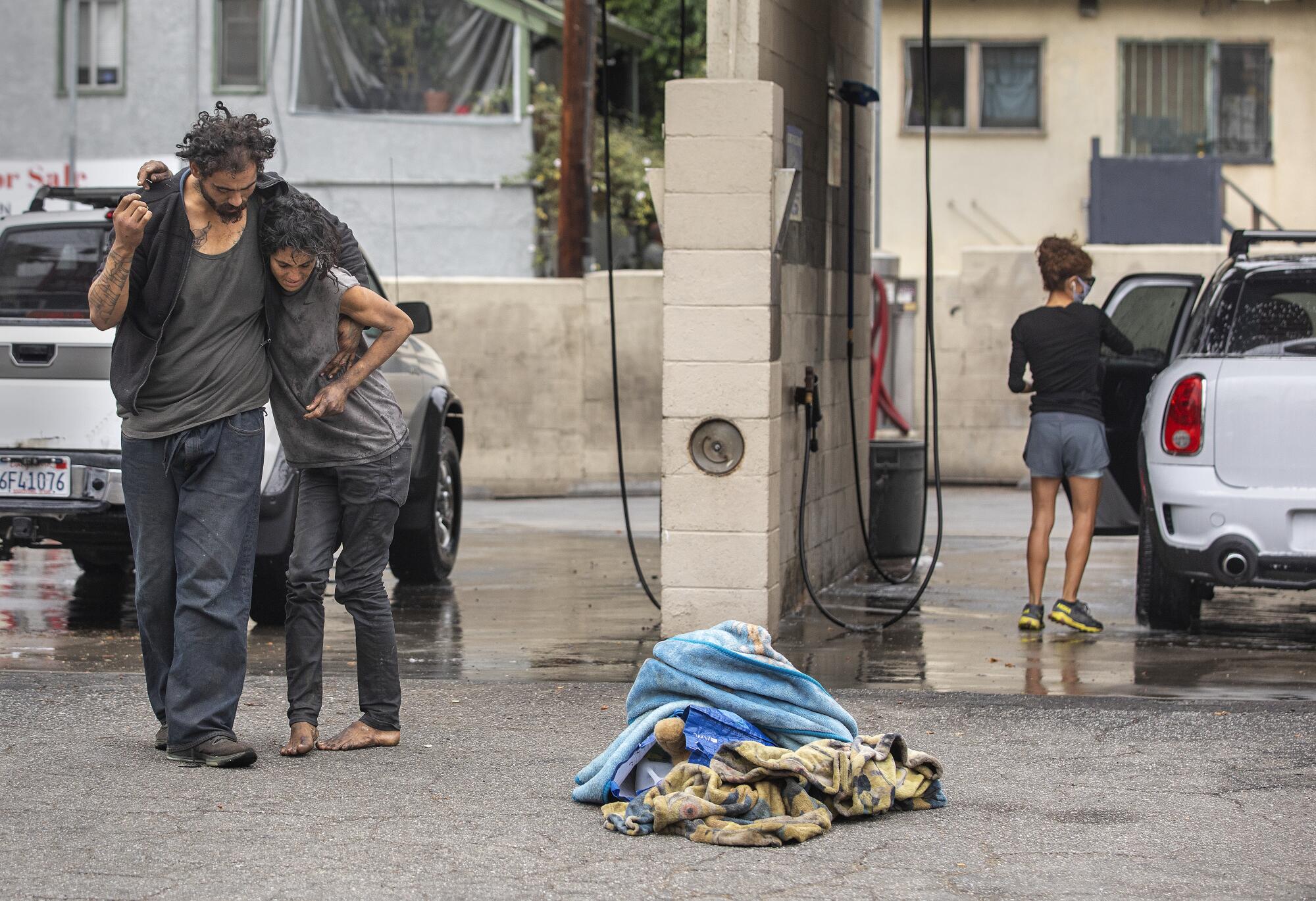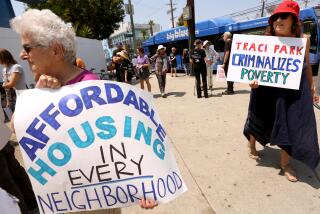
- Share via
She is barefoot, caked in dirt, may be pregnant and is often naked as she wanders the streets of Silver Lake.
Neighbors know her as Kristal, and she’s been deteriorating before their eyes.
They have been looping me in on their urgent emails and social media posts during the last week, as they gave updates on Kristal’s mental and physical condition and reached out to local officials for help. One resident said she came upon Kristal one night while driving on Sunset Boulevard.
Kristal “was in the middle of Sunset, unable to walk … scooting on the road on her hands and knees,” the driver posted on social media. “She was so filthy you couldn’t even see her until she was in your headlights.”
The story, unfortunately, sounds so heartbreakingly familiar here in the homelessness capital of the United States. Nearly four homeless people die daily in Los Angeles County, and so many others are visibly tormented by mental illness. I started the week working on a column about homelessness with a happier ending, and I’ll write that one soon.
But the pleas about Kristal sounded urgent. And Saturday is World Mental Health Day — a day to reflect on the fact that close to 1 billion people had a mental disorder pre-coronavirus, according to the event’s organizers, but for various reasons, the majority don’t get help. So I made a few phone calls.
Two social workers at a nonprofit told me some of Kristal’s background, saying she and her boyfriend were tough cases because of their illness and addiction, and their resistance to help. They’d been hospitalized, they’d been housed, and yet multiple interventions by various agencies had not helped turn them around.
Los Angeles City Councilman Mitch O’Farrell told me he and his staff have been trying for months to work with county officials to get help for Kristal. She had been hospitalized multiple times, O’Farrell said, but always ended up back in her routines, desperate as ever, but adamantly refusing offers of help.

On Thursday, O’Farrell sent a letter to the county mental health director, saying he feared Kristal will meet a tragic end if she isn’t soon given medical attention.
“She was almost hit by a bus a week ago and by a vehicle this past weekend while crawling across Sunset Boulevard at night. The police responded to calls only to have her boyfriend … physically pick her up and carry her away refusing services,” O’Farrell said in the letter.
Charlotte Innes, who lives near Sunset and Descanso Drive, told me she has seen Kristal in and around that intersection for at least three years. Innes said some neighbors have gotten involved out of compassion and others out of frustration, and she understands both, saying there have been episodes of late-night screaming, defecating in public, trespassing and lots of drug-related activities.
On Thursday, late afternoon, residents told me they had seen Kristal and her boyfriend sleeping in a little alcove at a car wash on Sunset. I drove over and found them there, still asleep, nestled up against each other, trash and belongings strewn about. They were barefoot, lying on a blanket that covered the grimy pavement.
When Kristal woke up, I tried to engage, calling out to her several times. She didn’t respond or even acknowledge me. It was as if my presence and my voice didn’t register. Her face was dark with dirt — dark as charcoal. I couldn’t tell whether she was 20 or 50; years on the streets had erased the normal features of age. She lay back down, and I could see that the bottom of one bare foot was pocked with wounds.
As one neighbor asked on social media:
“Are we going to let her die of neglect right in front of our eyes?”
It’s not neglect, exactly. In the city and county of Los Angeles, the outreach to mentally ill homeless people is made up of a thousand moving parts and an army of good people doing noble work.
But because of bureaucracy, legal barriers and a lack of specific resources at certain times, too many people fall through the cracks, and one great weakness is that there’s not enough follow-up when someone is released from care.
Some cases are extremely complicated, said Dr. Jonathan Sherin, L.A. County mental health director, and he is working on new strategies to engage those who resist help. He said “the system needs a significant dose of additional resources” flexible enough to meet specific needs.
“I would say on Mental Health Day, in light of the trauma our nation is experiencing from COVID, and from the specter of racial injustice as well as the homeless epidemic, mental health has clearly got to be prioritized as a human need and a right,” Sherin said.
He told me efforts have been underway to get Kristal conserved, a legal step in making sure she gets whatever help she needs. Outreach workers had been in touch with her early in the week, he said, and a doctor was being sent back Friday afternoon to determine whether she needs immediate hospitalization.
I know from personal experience how hard it is to help someone with severe mental illness who resists help. I know how long it can take to have a breakthrough, that sometimes there is no breakthrough and that your humanity demands you keep trying.
Against the drab gray wall of the car wash stall in Silver Lake, Kristal and her boyfriend looked like cave dwellers. In civil society, you have to fight against becoming overwhelmed or jaded; you have to demand more of policymakers and of those who resist housing and other services in their neighborhoods. You cannot allow Kristal’s level of deterioration, suffering and indignity to become acceptable.
Friday afternoon, Sherin texted me with an update:
“She has deteriorated significantly since the prior exam earlier in the week. Ambulance coming …”
More to Read
Sign up for Essential California
The most important California stories and recommendations in your inbox every morning.
You may occasionally receive promotional content from the Los Angeles Times.











